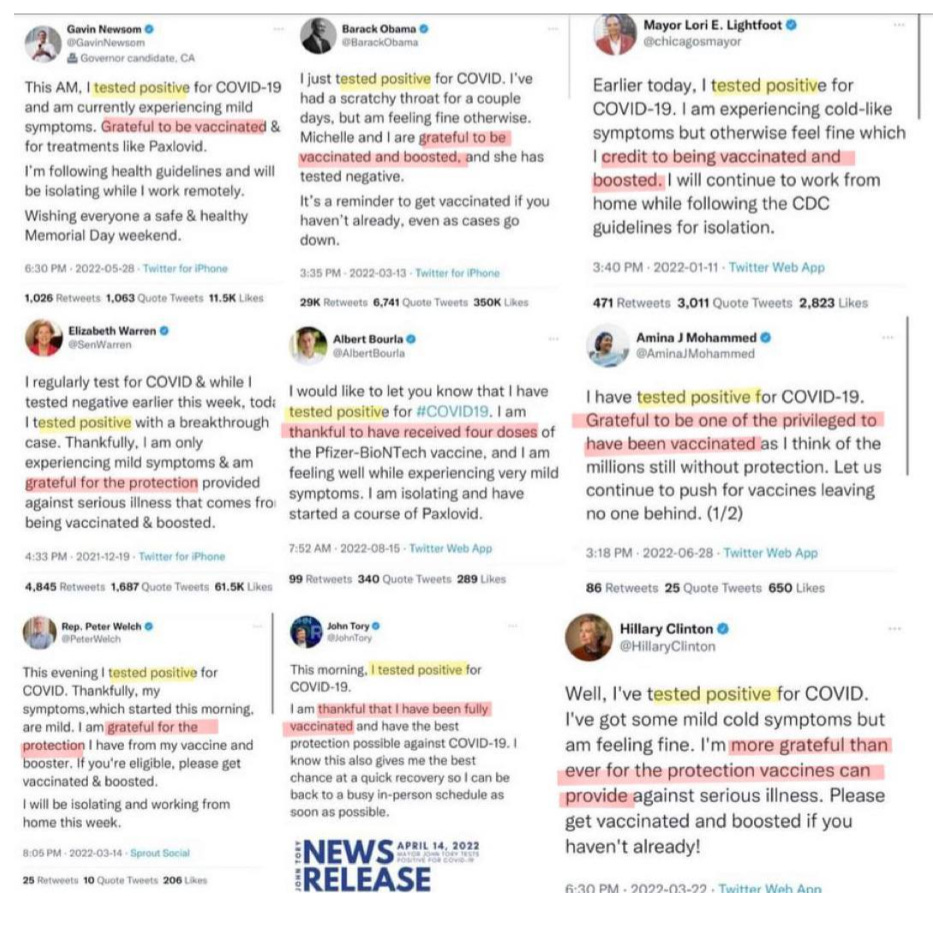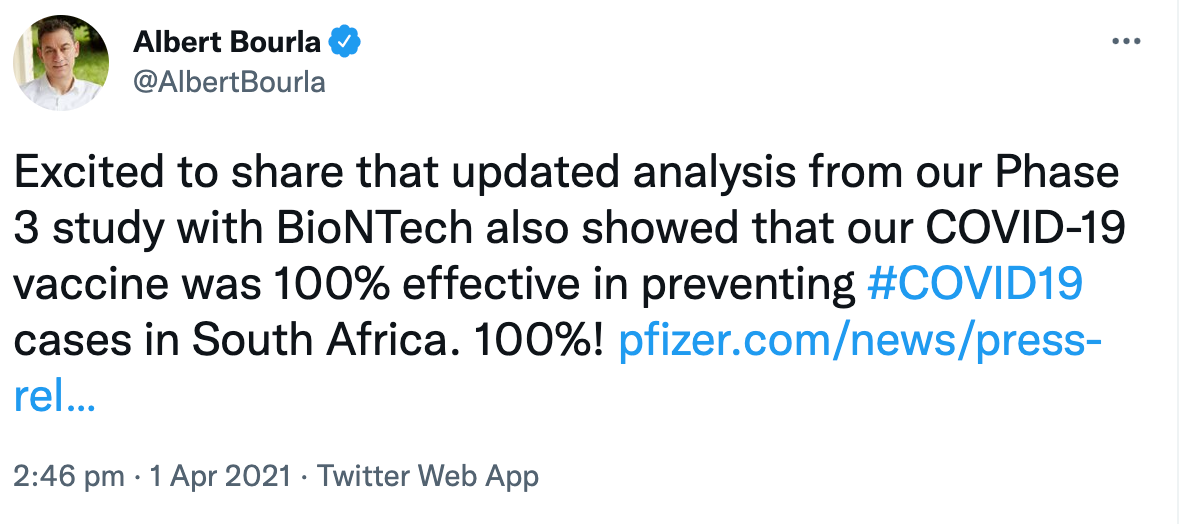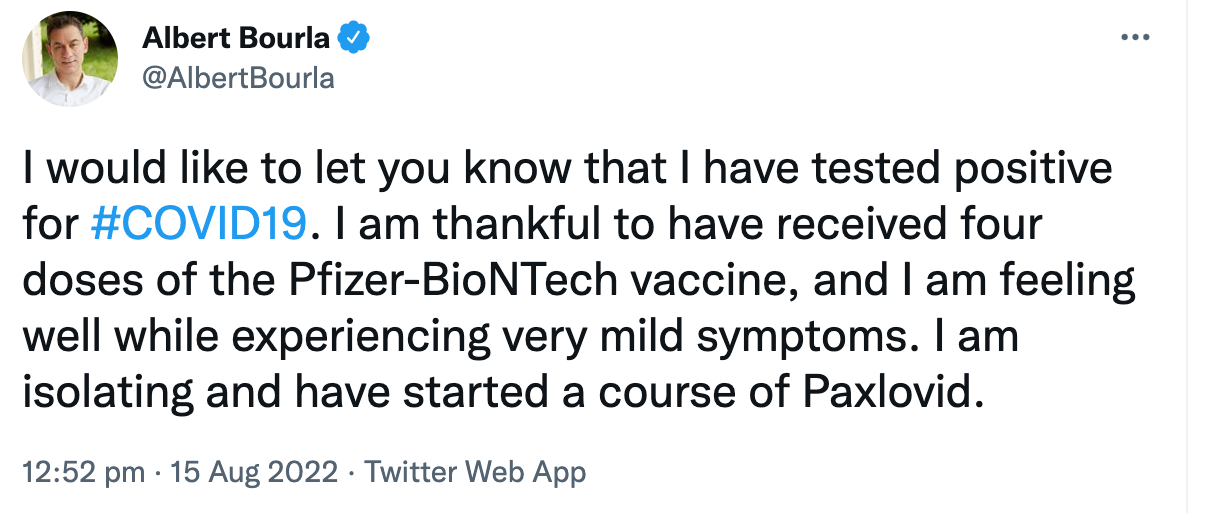TWO POSITIVES AND FOUR DOSES OF YOUR OWN JAB? WE SEE THROUGH YOU NOW, BOURLA
Pfizer CEO over shares on Twitter… has the tide of public sentiment now turned?
By Charlotte Hervis
WHEN Pfizer CEO Albert Bourla revealed on Twitter on September 24 this year that he had tested positive for Covid, it came less than six weeks after announcing that he had tested positive and had previously received “four doses of the Pfizer-BioNTech vaccine”.
Not forgetting the bold claims made on April 1, 2021 in the early days of the jab rollout that it “was 100 per cent effective in preventing Covid cases in South Africa”.
First, let’s analyse the use of language and try to infer some meaning from his communications.
In his September 2022 announcement he said:
“I have tested positive for COVID. I’m feeling well and symptom free. I’ve not had the new bivalent booster yet, as I was following CDC guidelines to wait three months since my previous Covid case which was back in mid-August. While we’ve made great progress, the virus is still with us”

In August 2022 the messaging was similar:
“I would like to let you know that I have tested positive for Covid. I’m thankful to have received four doses of the Pfizer-BioNTech vaccine and I’m feeling well while experiencing very mild symptoms. I’m isolating and have started a course of Paxlovid.”
In both instances, he uses the opportunity to deliver sales messages on behalf of his company and to convey what could be described as ‘public health messaging’ – the virus is still with us, take a booster three months apart, self-isolate if you experience mild symptoms.
The formula should be obvious to observers with their eyes wide open. There are plenty of memes across social media showing communications from high-profile people sharing the mantra 1) I have Covid; 2) Thank goodness I took the vaccine or it would have been so much worse; 3) Hooray for the vaccines.
The wording across these tweets is remarkably similar. One could perhaps assume there is a social media etiquette handbook which the rich and powerful use when testing positive for Covid. Perhaps it is simply a huge coincidence.
Let’s reflect on a tweet from Bourla earlier in the jab rollout. On April 1, 2021, he tweeted:
“Excited to share that updated analysis from our Phase 3 study with BioNTech also showed that our Covid-19 vaccine was 100 per cent effective in preventing Covid cases in South Africa. 100%!”
Note the repetition of 100 per cent and use of the exclamation mark afterwards. It is almost as if he couldn’t believe it himself and so repeated the statistic for emphasis. Is there any symbolism to the announcement having been made on April Fool’s Day? I hope not. Nearly 18 months on, it is now common knowledge that the Covid ‘vaccinations’ do little to prevent Covid at all. How many of your double and triple boosted friends and family keep succumbing to a positive test?
Stop for a minute and re-read the evolving narrative. CEO of major pharmaceutical company, who previously claimed a treatment was 100 per cent effective, goes on to catch the disease twice in less than six weeks. What a crazy world we live in.
Next, let’s consider the audience engagement with Bourla’s tweets.
Bourla, who has 55.4k followers on Twitter, has received >12.7k replies, 1,228 retweets, 3,228 quote tweets, 4,267 likes in 48 hours since his September announcement.
His August tweet fared similarly – >18.8k replies, 1,489 retweets, 5,431 quote tweets and 3,479 likes.
In comparison with Bourla’s other posts, these tweets have gone viral. The level of replies and quote tweets versus the number of likes is the very definition of having been ‘ratioed’ – suggesting that these messages from Bourla are controversial, divisive or unpopular. If people have bothered to respond to or quote tweet him, meaning they reshared the post with the addition of a personal comment, these are individuals who are fired up, driven and making an effort to spread their messages of dissent.
Looking past the numbers, a rudimentary sentiment analysis of the replies Bourla is receiving suggests that the company has lost control of the narrative – scroll through some of the replies and you will encounter heart-breaking stories of those harmed by the shots, sarcastic comments about profiteering and a building feeling of scepticism from those who might have previously Trusted The Science who now feel let down and even betrayed.
So, where should Albert Bourla go from here in terms of future communications strategy? Attempts to gain positive outcomes by delivering positive sales messages in such communications are backfiring. Would it help if Bourla turned off comments, as Moderna have done? (check for yourself: https://twitter.com/ModernaTX). This would not facilitate the kind of two way ‘listen and respond’ communication that social media normally engenders.
It seems that Bourla should stop sharing his ‘health’ status on social, just like we all should. Indeed, we should all reconsider having shared our health status with anyone these past few years, be it publicly on social media, using mass screening and big data collection tools such as the UK’s Zoe App or Test and Trace systems or acquiescing to the pressure to conform in societies which introduced vaccine mandates.
Pfizer’s executive communications team must now be reflecting on the unintended consequences of over sharing. Have we now passed a tipping point of public sentiment? I hope so.








Was this too harsh?
https://twitter.com/koronamatata/status/1574087925037469696